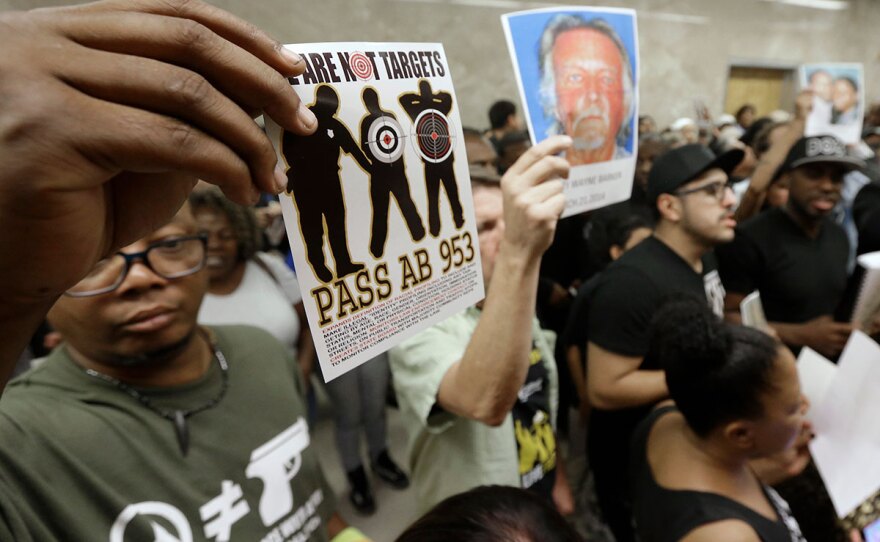California police agencies should routinely review officers' social media, cellphones and computers for racist, bigoted or other offensive content that contributes to disproportionate police stops of Black people, a state advisory board said Monday.
The controversial recommendation comes from community and law enforcement representatives who analyzed nearly 4 million vehicle and pedestrian stops by California’s 15 largest law enforcement agencies in 2019.
The Racial and Identity Profiling Advisory Board report was unveiled amid calls to defund police and promises from state lawmakers to renew efforts to strip badges from bad officers, make more police misconduct records public, and allow community groups to handle mental health and drug calls where police powers may not be needed.
People who were perceived as Black were more than twice as likely to be stopped as their percentage of the population would suggest, the board said in its fourth annual report.
Black people also had the highest proportion of their stops (21%) for reasonable suspicion, while the most common reason for stops of people of all races was traffic violations. Black people were searched at 2.5 times the rate of people perceived as white.
RELATED: Report: California Cops More Likely To Stop Black Drivers
And the odds were 1.45 times greater that someone perceived as Black had force used against them during a traffic stop compared to someone perceived as white. The odds were 1.18 times greater for people perceived as Latino.
Reform efforts have often focused on increasing training to make officers aware of how their implicit, or unconscious, bias may affect their interactions. Starting this year, a new law also requires agencies to screen job applicants for implicit and explicit biases based on race or ethnicity, gender, nationality, religion, disability or sexual orientation.
“Unchecked explicit bias may lead to some of the stop data disparities we have observed,” the board said.
Explicitly racist or bigoted social media posts by some law enforcement officers appear to be a widespread problem nationwide, it said, citing a study by the Plain View Project that examined the Facebook accounts of 2,900 active and 600 retired officers in eight departments across the country.
In California, current and former San Jose Police Department officers were found to have shared racist Facebook posts for years, forcing the Santa Clara County district attorney’s office to dismiss 14 criminal cases involving officers who posted remarks. Other agencies, including the Los Angeles County Sheriff’s Department and San Francisco Police Department, have been involved in similar issues.
The board recommended that agencies review employees' social media posts and routinely check officers' department-issued cellphones and computers to make sure they aren't showing racist or other problematic behavior.
Police departments “demand fair and impartial police services for the communities they serve,” responded Chief Eric Nuñez, president of the California Police Chiefs Association, citing training efforts to control implicit bias. But he said checking officers' cellphones, computers and social media accounts "would require a significant additional funding source, time and legal issues that have not been properly identified or researched at this point.”
Organizations representing sheriffs and rank-and-file officers did not respond to requests for comment.
RELATED: SDPD Chief Vows Probe Of Officer’s Alleged Online Mockery Of Dead Suspect
The board also said police and dispatchers should be trained to watch for what it called “bias by proxy,” where callers ask police to respond to an unfounded or ill-informed complaint driven by the caller's biases.
“We’ve done all of the reformist things. We’ve done trainings, we’ve done body cameras, we’ve done police commissions, we’ve hired from the community. All of these things to tinker around the edges of this very large problem, but really what we’ve been doing is putting Band-Aids on gunshot wounds,” said Cat Brooks, executive director of Justice Teams Network and co-founder of the Anti Police-Terror Project.
The findings in the report were not surprising, she said, and show the need for a “complete transformation” from an emphasis on police and prisons to one focused on addressing root community causes such as hunger and homelessness.
The report's data is little changed from a year ago when stops involving the state's eight largest agencies were studied for the second half of 2018, before the death of George Floyd in Minneapolis and other police killings of primarily Black and Latino men sparked nationwide protests and reform efforts last year.
It shows “there is significant work to be done to prevent further disparities in who is stopped, how they are treated when stopped, and the outcomes of those stops,” the board said.
A 2015 state law requires California police to record their perception of the race, gender and sexual orientation of anyone they stop.
Black people make up 7% of the population but were involved in 16% of California stops in 2019. Those perceived to be of Middle Eastern or South Asian descent accounted for 5% of stops and 2% of the population.
Whites and Latinos were one to two percentage points less likely to be stopped than their proportion of the population would indicate, while those of Asian background account for 12% of the population and just 6% of stops.







